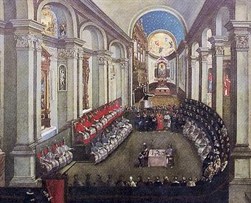Council of Trent
 The Council of Trent began its work on 13 December 1545 and was called by Pope Paul III as a result of the Protestant Reformation and at the request of the Habsburg emperor Charles V (1500-1558), who was anxious to put an end to religious disagreements. The headquarters of Trent was chosen for its strategic location, which ensured both papal and imperial needs: it was, in fact, a city of the Holy Roman Empire, culturally and geographically close to the places where Protestantism was spreading, however, not within Germany and, in addition, ruled by a prince-bishop. The Council took place in three phases, with various interruptions, with an intermediate shift from Trent to Bologna (1547-1549) and under the authority of four successive popes: Paul III, Julius III, Paul IV and Pius IV, who completed it in 1563. Overall, the working sessions of the council lasted four years. It was an exclusively Catholic meeting, which worked to reaffirm the unique authority of the Church of Rome, to oppose the advance of Protestantism and start an ideal religious, political and even military reaction, called by historians the Counter Reformation (or, alternatively, Catholic Reformation, by those who emphasize the positive aspects). Once the Council was over, Pope Pius IV endorsed the decrees and promulgated the new Tridentine confession of faith (1564). The application of the new rules led to a profound restructuring of the church, forcing its members to work for a kind of new evangelization of society. The bishops, for example, were responsible for carrying out regular pastoral visits in their respective dioceses, to check the moral and material conditions of the faithful and to facilitate the implementation of the decrees. On theological matters, the Council reaffirmed the principles challenged by the Protestants: the value of church tradition, the mediation of the clergy and the faithful of the Church in the relationship with the Word of God, the mediating presence of the earthly Church and the saints, and of good works for the attainment of salvation and the validity of the seven sacraments.
The Council of Trent began its work on 13 December 1545 and was called by Pope Paul III as a result of the Protestant Reformation and at the request of the Habsburg emperor Charles V (1500-1558), who was anxious to put an end to religious disagreements. The headquarters of Trent was chosen for its strategic location, which ensured both papal and imperial needs: it was, in fact, a city of the Holy Roman Empire, culturally and geographically close to the places where Protestantism was spreading, however, not within Germany and, in addition, ruled by a prince-bishop. The Council took place in three phases, with various interruptions, with an intermediate shift from Trent to Bologna (1547-1549) and under the authority of four successive popes: Paul III, Julius III, Paul IV and Pius IV, who completed it in 1563. Overall, the working sessions of the council lasted four years. It was an exclusively Catholic meeting, which worked to reaffirm the unique authority of the Church of Rome, to oppose the advance of Protestantism and start an ideal religious, political and even military reaction, called by historians the Counter Reformation (or, alternatively, Catholic Reformation, by those who emphasize the positive aspects). Once the Council was over, Pope Pius IV endorsed the decrees and promulgated the new Tridentine confession of faith (1564). The application of the new rules led to a profound restructuring of the church, forcing its members to work for a kind of new evangelization of society. The bishops, for example, were responsible for carrying out regular pastoral visits in their respective dioceses, to check the moral and material conditions of the faithful and to facilitate the implementation of the decrees. On theological matters, the Council reaffirmed the principles challenged by the Protestants: the value of church tradition, the mediation of the clergy and the faithful of the Church in the relationship with the Word of God, the mediating presence of the earthly Church and the saints, and of good works for the attainment of salvation and the validity of the seven sacraments.
Read more:
-
H. Jedin, Geschichte des Konzils von Trient, 5 vv., Freiburg 1957-1977.
-
P. Prodi, W. Reinhard (a cura di), Il Concilio di Trento e il moderno, Bologna 1996.
-
A. Prosperi, Il Concilio di Trento. Una introduzione storica, Torino 2001.
